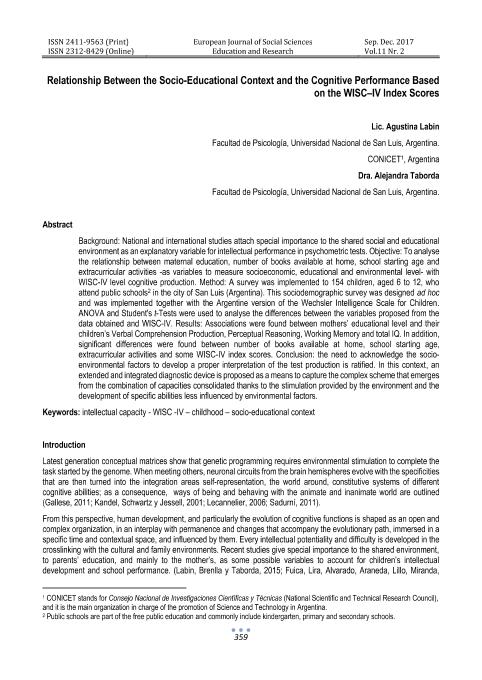Mostrar el registro sencillo del ítem
dc.contributor.author
Labin, Agustina

dc.contributor.author
Taborda, Ruth Alejandra

dc.date.available
2022-01-27T19:11:53Z
dc.date.issued
2017-10
dc.identifier.citation
Labin, Agustina; Taborda, Ruth Alejandra; Relationship Between the Socio-Educational Context and the Cognitive Performance Based on the WISC–IV Index Scores; European Center for Science Education and Research; European Journal of Social Sciences Education and Research; 11; 2; 10-2017; 359-362
dc.identifier.issn
2312-8429
dc.identifier.uri
http://hdl.handle.net/11336/150841
dc.description.abstract
Background: National and international studies attach special importance to the shared social and educational environment as an explanatory variable for intellectual performance in psychometric tests. Objective: To analyse the relationship between maternal education, number of books available at home, school starting age and extracurricular activities -as variables to measure socioeconomic, educational and environmental level- with WISC-IV level cognitive production. Method: A survey was implemented to 154 children, aged 6 to 12, who attend public schools2 in the city of San Luis (Argentina). This sociodemographic survey was designed ad hoc and was implemented together with the Argentine version of the Wechsler Intelligence Scale for Children. ANOVA and Student's t-Tests were used to analyse the differences between the variables proposed from the data obtained and WISC-IV. Results: Associations were found between mothers’ educational level and their children’s Verbal Comprehension Production, Perceptual Reasoning, Working Memory and total IQ. In addition, significant differences were found between number of books available at home, school starting age, extracurricular activities and some WISC-IV index scores. Conclusion: the need to acknowledge the socioenvironmental factors to develop a proper interpretation of the test production is ratified. In this context, an extended and integrated diagnostic device is proposed as a means to capture the complex scheme that emerges from the combination of capacities consolidated thanks to the stimulation provided by the environment and the development of specific abilities less influenced by environmental factors.
dc.format
application/pdf
dc.language.iso
eng
dc.publisher
European Center for Science Education and Research
dc.rights
info:eu-repo/semantics/openAccess
dc.rights.uri
https://creativecommons.org/licenses/by-sa/2.5/ar/
dc.subject
Intellectual capacity
dc.subject
WISC-IV
dc.subject
Childhood
dc.subject
Socio-educational context
dc.subject.classification
Otras Psicología

dc.subject.classification
Psicología

dc.subject.classification
CIENCIAS SOCIALES

dc.title
Relationship Between the Socio-Educational Context and the Cognitive Performance Based on the WISC–IV Index Scores
dc.type
info:eu-repo/semantics/article
dc.type
info:ar-repo/semantics/artículo
dc.type
info:eu-repo/semantics/publishedVersion
dc.date.updated
2022-01-25T15:03:45Z
dc.identifier.eissn
2411-9563
dc.journal.volume
11
dc.journal.number
2
dc.journal.pagination
359-362
dc.journal.pais
Albania

dc.description.fil
Fil: Labin, Agustina. Consejo Nacional de Investigaciones Científicas y Técnicas. Centro Científico Tecnológico Conicet - San Luis; Argentina. Universidad Nacional de San Luis. Facultad de Psicología; Argentina
dc.description.fil
Fil: Taborda, Ruth Alejandra. Universidad Nacional de San Luis. Facultad de Psicología; Argentina
dc.journal.title
European Journal of Social Sciences Education and Research
dc.relation.alternativeid
info:eu-repo/semantics/altIdentifier/url/http://journals.euser.org/index.php/ejser/article/view/2779
dc.relation.alternativeid
info:eu-repo/semantics/altIdentifier/url/https://revistia.com/files/articles/ejser_v4_i4s_17/Agustina.pdf
dc.relation.alternativeid
info:eu-repo/semantics/altIdentifier/doi/https://doi.org/10.26417/ejser.v11i2.p194-199
Archivos asociados
